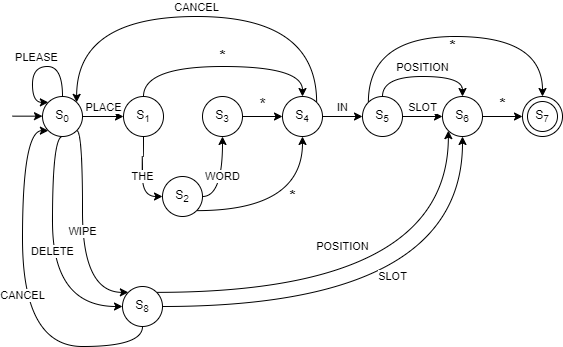Copyright (c) 2020 Caleb L. Power. All rights reserved.
The purpose of this program is to demonstrate a deterministic finite state automaton and show how it could be used in rudimentary forms of natural voice processing.
You need Java 11. This project can be tested and compiled with the following command.
gradle clean test shadowJar
To run it, just do java -jar build\libs\dfa-parser.jar.
You'll need to enter a string of text in accordance with the grammar below.
To quit the program, you can just hit CTRL + C.
If you're going to use the Bootloader in a different program, keep the following in mind:
- The schema has to be a single JSON object.
- Each top-level object in the main JSON object needs to have an integer key, even though it's represented as a string.
- The top-level object with the lowest key will be the starting point. There can only be one starting point.
- Each top-level object may or may not contain a "transitions" object
- The splat is a reserved keyword in the "transitions" object; it denotes a default state on any token.
- Explicitly-defined transitions take precedence over implicitly-defined splat transitions.
- Top-level objects can contain a "state" variable-- either "restart" or "done".
- Top-level objects can contain a "set" object, which must have both a "key" and a "value".
- Top-level objects can contain a "save" object, which will save the transition to the specified key.
- The "set" key and the "save" key cannot be the same for one state.
This code repository has been released under the Apache License, Version 2.0.
